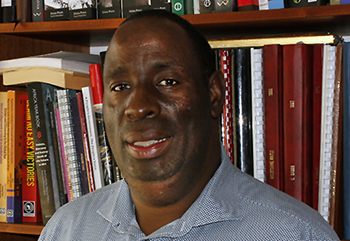Latest News Archive
Please select Category, Year, and then Month to display items
12 January 2024
|
Story Nonsindiswe Qwabe
|
Photo Sonia Small
 Since joining the UFS in 2008, Dr Grey Magaiza has worked extensively on approaches that can foster the socio-economic transformation of societies.
Since joining the UFS in 2008, Dr Grey Magaiza has worked extensively on approaches that can foster the socio-economic transformation of societies.
“The future should be one where communities can decide on their development agenda and futures. That’s the most important for me.” Dr Grey Magaiza, Deputy Director of the Centre for Gender and Africa Studies (CGAS) and Head of the Community Development programme on the Qwaqwa Campus, is passionate about capacitating communities to be agents of change and advancement. His vision for the future emphasises the empowerment of communities to take charge of their development by actively participating in decision making and the implementation of development projects that can improve their lives.
Since joining the UFS in 2008, Dr Magaiza has worked extensively on approaches that can foster the socio-economic transformation of societies. Over the years, he has crafted his research speciality into one that he is most proud of – being an interdisciplinary scientist immersed in the development of communities.
“I’m in a fortunate position of researching what I like. I say ‘fortunate’, because I’ve taken the time to understand what I’m passionate about, which is the overall field of rural livelihoods and livelihood futures – in short, community development. My research starts from an engaged university, understanding the elements that a university must use to enhance transformation and relevance to its immediate community in terms of development.”
One of the ways he has done this is by looking at social entrepreneurship as a development approach for young people in a rural setting. Through workshops with non-profit and civic organisations in Qwaqwa, Dr Magaiza has been helping these organisations to map out their needs and actively meet them through the involvement and support of external role players.
“We understand that communities are part of the national development agenda, but even that national agenda respects community knowledge and intentions and allows communities to shape their identity. A critical enabler of this is community organising. You bring back the capacity in communities to have dialogues on issues affecting them as spaces for engagement, knowledge exchange, and for people to just talk about their way forward.”
By enabling communities to define their development agenda, they can address their specific needs, challenges, and aspirations, he said. “When I look at livelihood futures, it’s quite an exciting aspect of my work – it’s like looking into a fortune tellers’ globe, because you’re not deciding for communities what they should do, but the communities themselves take those decisions.”
UFS History lecturer becomes Visiting Fellow at Harvard
2015-05-25

Dr Chitja Twala
Photo: Eugene Seegers |
Prestige Scholar and lecturer of African/South African History at the UFS, Dr Chitja Twala, was recently accepted as a Visiting Fellow at the Harvard Graduate School of Arts and Sciences (GSAS).
A Visiting Fellow status is available to individuals holding a doctoral degree to pursue independent research at Harvard. The Fellowship is for non-degree purposes but aims at the enhancement and further intellectual development of those involved. It focuses on enrichment and development programmes.
Twala was appointed in the Department of History at the UFS in the beginning of 2003. His research field is Liberation History, with specific reference to the liberation movements on the SADC region. He has published extensively on this field and presented papers in local and international conferences.
“I applied (to Harvard GSAS) in April 2014 for the Fellowship through the South Africa Harvard Fellowship Programme,” says Twala.
“After being successful in the interviews conducted by the GSAS panel in July 2014, I had to apply for admission in the Department of African and African American Studies at Harvard, and got accepted for the Fall Semester of 2015.”
At Harvard, Twala will be mentored by Prof Emmanuel Akyeampong (African History Expert).
“Firstly, my main assignment will be to grasp a much deeper theoretical knowledge/framework in historical studies and a broader repertoire of methodologies in the field of African History. Secondly, if time permits, I will be presenting seminars and attending some in a very challenging, stimulating, and intellectually demanding environment where my ideas can be tested and expanded. Thirdly, I will be exposed to new trends as far as African historiography is concerned. Lastly, I will informally engage and exchange some ideas with some experts in the field of African History.”
The programme was recommended to Twala by the Vice-Chancellor and Rector, Prof Jonathan Jansen and Prof Ian Phimister, Centre for Africa Studies Senior Professor at UFS.
“As per the priorities of the Prestige Scholarship Programme, the Fellowship will assist in inculcating in me the intellectual breadth and depth required to pose critical questions and generate ground-breaking knowledge for History as a discipline. It is important for the UFS to establish and sustain international networks with other leading universities and scholars around the world.
“I applied for this Fellowship in order to advance further and broaden the scope in the three areas of scholarship in higher education: discovery, teaching, and public engagement,” says Twala.
Twala will be leaving for Harvard by mid-August and will return by the end of December 2015.